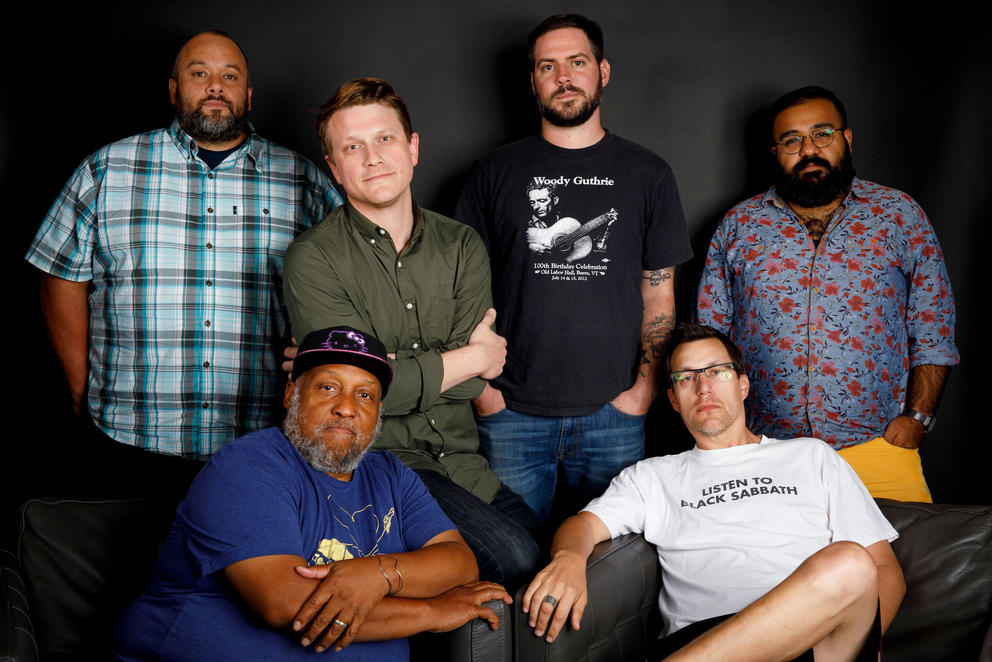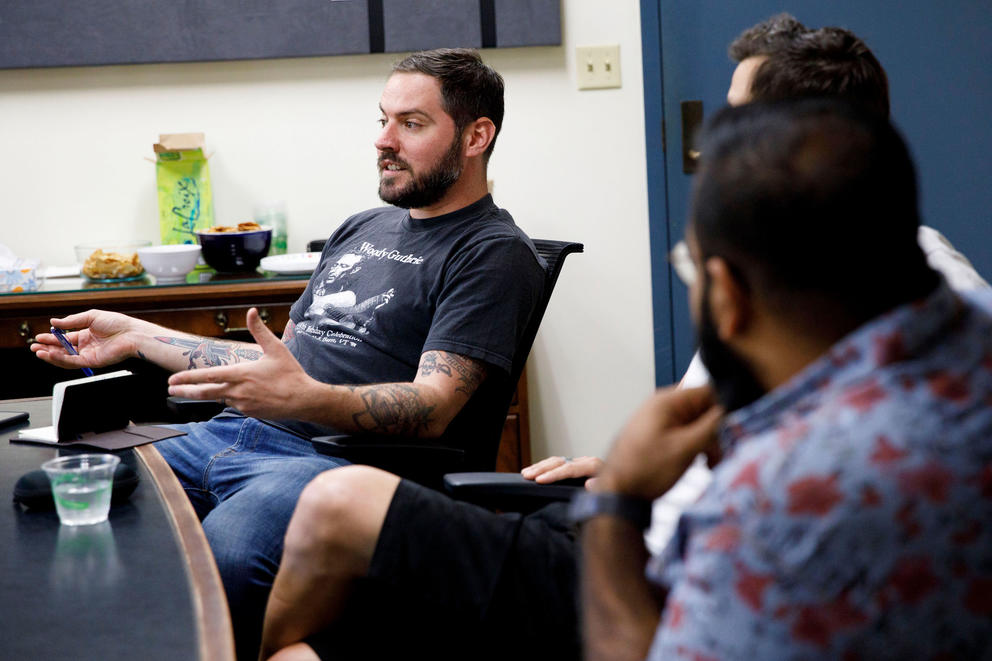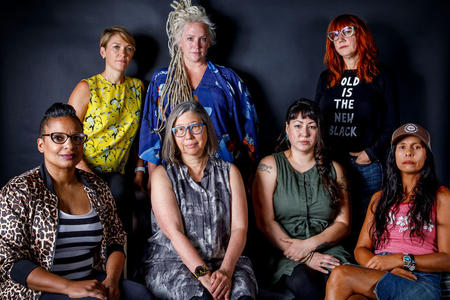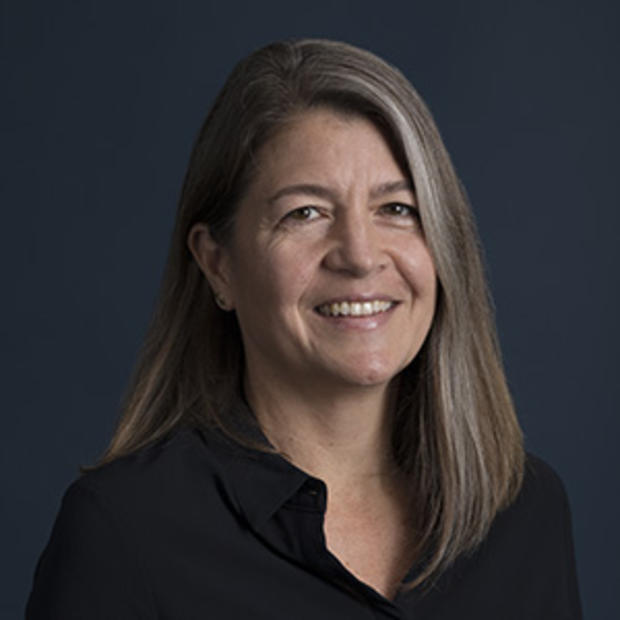On Sept. 5, we convened a group of six men — similarly, these are influencers in the local music and restaurant industry — to ask them that question, as well as many more regarding how to move forward in light of Me Too, and specifically what are the most important things men can do to help stop sexual misconduct.
We discovered the men were extremely eager to talk — in fact, our conversation stretched to three hours. In part, the men said, because they felt an in-person discussion was more informative and productive than the highly charged exchanges that take place on social media. They were hungry to debate strategies for change, willing to be wrong and, most importantly, want to continue talking.
This transcript of our conversation has been condensed and edited.
Crosscut: Can you introduce yourselves and tell us why you agreed to participate.
Ashraf Hasham: I’m the Executive Director of The Vera Project [all-ages music and arts venue]. I want to do my part to make things better and equal and as safe as it can be for people to talk more about these things.
Steven Severin: I’m co-owner of Neumos and Barboza. I agreed to come today because Dave Meinert was an old friend and a quasi-mentor.
What happened really opened my eyes to how much of this shit has been going on, particularly in my industry. It really made me think of how naïve I was. I found out how little I did know about women’s rights and how we treat women.
Chris Elford: I own Navy Strength and No Anchor in Belltown with my wife, Anu [Apte], who also owns Rob Roy. I wanted to be here for two reasons. One, we already proactively started the conversation company-wide with our entire staff. We just sat 45 people down and were like, let’s talk about it. We have a language that’s developing. Then I found out that most bars haven’t done that.
The second reason is because about two and half years ago, a story broke about one of my best friends, an L.A. bartender, that was as severe, if not more, than what I understand has been happening with Dave [Meinert]. A very dear friend. And, it really fucking broke me.
Kevin Sur: I’m a founder of Artist Home. We put on events like Timber! Music Festival. I am excited about any opportunity where real dialogue can happen and help us evolve. I don’t think that there’s any one solution. I think that there’s just a constant path toward improving that will never end.
Matt Bishop: I am the lead singer of Hey Marseilles, and we were managed by Dave Meinert.
I had some reticence [about coming] because I think by default, men take up a lot of space in a room and a lot of volume in a conversation. I also really do think our culture doesn’t afford a lot of space for men to inhabit the spectrum of self-reflection or feelings that are necessary to combat toxic masculinity.
I also think as men who are willing to have this conversation, we need to be vocal and provide a model in communicating. These are masculine things to talk about: Caring about women, talking about our feelings, being self-reflective, trying to deconstruct the shit that we’ve been growing up with in our family households.
Riz Rollins: I’ve been at radio station KEXP for 30 years. I’ve been involved in the club scene for 30 years. And, I’m here because I was asked. I just wanted to be a part of the conversation. It’s the least I could do.
I’ve considered the community that I’ve worked in to be kind of a protective subculture. To find out that one of the people in charge of that subculture was guilty of serial abuse, I’m still in shock.
I originally had mentioned something on Facebook, and was absolutely, totally surprised at the amount of people that were talking or wanted to talk. And, the pushback! I was personally threatened. Not that I feel threatened. But, you know, you’re telling me to watch my back?
Sur: Social media is a place where everybody expects men to speak up, but it’s not necessarily a place where that is allowed. Even if you’re trying to put an idea forward, if it’s not the idea, you’re two steps away from being called an abuser by people who use this as a means to bully other people. While Facebook has been a really good place to find justice that women don’t get [elsewhere], it’s also not a place where people are allowed to have a dialogue — culturally, politically, racially, everything.
Elford: I outed an abuser, and it went significantly different than I thought it would. There were anonymous allegations coming out. I grabbed a few other people and we invited this person to lunch. And, we were like, “Hey, straight up, this is what we heard about you. We need to talk about it.”
I thought it was going to be a much more honest conversation. And that dude was basically just like, “I have no idea what you’re talking about.”
He couldn’t process the concept of an anonymous accuser. A big part of that is because of the way that our justice system is set up. That’s in place for a reason, but obviously for a lot of victims, accusing someone is the same as reliving the experience. So, that wasn’t gonna happen.
But I was trying to get him to look at it objectively. Are there nights that you don’t remember that things like this could have happened? If that is the case, do you wanna look at your drinking or substance abuse? Is that where can we start this? I was hoping we could have this conversation and he could be like, “You know what? I need to change the way I act. The way I party. The way I interact with women specifically.” But, that didn’t happen.
This person ended up withdrawing from the scene in Seattle and moved abroad. And is completely anonymous there now. I feel like they escaped in a way.
Severin: I agree with you 100 percent. If somebody has done something, they gotta be called out. It’s too easy for people to hide.
Rollins: Particularly in this city, [the perpetrators] take advantage of people not wanting to be confrontational. They know that nobody’s gonna confront them. So, considering the whole Dave Meinert thing, that he operated, at least for 15 years, outing might be a really healthy thing to do. But I don’t know how to go about it. One, because I know it can be litigious.
Severin: I understand that women don’t want to come out because it would ruin their lives, their careers. Because of the way our society is set up. It’s so much harder for women to be able to get ahead.
Elford: Well, it’s like the Weinstein thing. That’s why so many of these women didn’t say something for 20 or 30 years.
Severin: Right. They didn’t want to take that chance of ruining everything, so they did nothing. And I get it. But, as men, if we know people, we gotta call them out.
Because this was our safe little community. This is Seattle. It’s our little bubble. Myself and a lot of people were just naïve and would think, “Oh that’s not going to happen around us. These are good people.” I’ve seen David do really good things for Seattle and this state and the community. And, then you find out something like this and it’s just...
Crosscut: Is this something unique to Seattle — that protective subculture? Is there something about this place that has nurtured a kind of naïve bubble?
Sur: Men harassing and assaulting women is just a constant in society. Not only has the Me Too movement been a necessary call to action to get some form of justice in a world where women can’t get justice, it’s also opened up a lot of women’s eyes. A lot of things that have happened to them they just haven’t really put on the table and said, “That was harassment.”
Elford: They didn’t process it that way.
Sur: And, I think on one hand, [by] outing people on social media, the Me Too movement has been crucial. It’s empowered other women to do the same. I think it’s also enlightened other people to recognize, “Oh, shit. That happened to me.”
Rollins: When I heard about the allegations with Dave, the first thing that I thought speaks to the bubble thing. I thought, wait a minute, these women have to be our friends. Even though they’re anonymous, even before I read the story, I thought, these are our friends.
I feel like we work in a culture where we’ve been really proud to say up front, You’re safe here. We have signage that says, “We will not tolerate... we will not allow…”
Severin: And so did Dave.
Rollins: Absolutely. And that’s why I’m in shock.
David kissed me, publicly at a Pride event last year. He was drunk. He took off his pants and danced in his underwear. I thought it was odd behavior, but it’s David. He drunk. It’s Pride.
It wasn’t until two or three weeks after the story broke that a coworker came up to me and said, “I’ve been really feeling bad about what happened to you.” And, I’m thinking, what happened to me? ’Cause, you go out, you drink, dudes might get, as he said, handsy. And, she said, “I saw that happen. I watched it and I felt like I should have said something. I should have done something. And I didn’t. And I wanted to know, Are you okay?”
Until that point, I was okay. After that, I probably didn’t leave the house for a couple of days. Not because I felt any extreme sense of violation. But I realized that somebody had actually taken advantage of me. And then I went through the roll call of how many times I’ve been taken advantage of on this level.
Like I said, because we give this credence to being in a safe space, I didn’t feel personally violated in that space. In large part because I’m a man. And because this doesn’t happen to other men. Clearly, it does.
So many men — way too many men — support him and defend him. The defense just boggles my mind. It’s like, are you kidding me? Are we really having this conversation? I heard, “Let’s see, innocent until proven guilty.” The terms “lynch mob” and “witch hunt” … people were using these words.
To see these men who I’ve worked with as bouncers, who I’ve worked with as DJs, to come after these women. If I heard the things that I heard personally, I cannot imagine what the women have heard. And what the women have been seeing. And what they’ve had to endure. ’Cause this was a surprise to me. But for them, for it to be almost a normative thing, aggrieves me.
Severin: One thing I wanted to say about the little bubble of Seattle.... We were at South by Southwest [in Austin], 10 or 12 years ago, and we’re hanging out with a bunch of agents. And I’m with Chad from Showbox, Adam from STG/Neptune … there were like five talent buyers from Seattle hanging out, drinking, having a great time, and agents were like, “This would never, ever happen in New York or L.A.” They are going at each other’s throats all day and all night. And, I mean 10:00 to 6:00 we’re all going for the same shows, it’s our livelihood, it’s how we eat. But we’re all friends. They could not believe that. They were just like, “This wouldn’t happen anywhere else in the country.”
Sur: It is a very specific thing in this market. It’s often talked about — this is so weird and rare. But I can totally testify to that being an amazing thing about Seattle.
Crosscut: So does that kind of bubble lead to blind spots when there’s sexual misconduct? And if there is a problem, shouldn’t that family dynamic mean women would feel comfortable finding allies to address it?
Sur: I don’t know. I think when you get into the Seattle music industry, there are just a handful of avenues in which you can start to make a career. At the top of almost every one of those, there’s a dude.
Elford: When I think about close-knit communities, there’s a family, and if you use that as an analogy for dealing with stuff like this, within a family you can create a culture. All of us grew up in different types of households. I grew up in an evangelical Christian household, which certainly has given me a different perspective as I walk through all of these things. My family didn’t talk about sex. But then, I had friends whose family was super open about stuff like this, and basically, the people who were in charge were creating the culture that they wanted to create, and then that’s either perpetuated or not by the people that are within it. So, my community has changed through a lot of these accusations and misconduct, because we were like, holy shit, I guess we have to talk about this now. And so, we’re more intentional about it.
I think that one major step that any industry can make: just be intentional and talk. Sit down. Don’t say we need to talk about it, pick a date and get some people in a room and talk.
Sur: I think having females present at every level is vital. And there are certain areas where I think there is a lack of female representation. Our production manager, he’s very intentional about how he hires. But he learned from a woman who used to run every event at the Seattle Center, who gave him this motive: You need to make your staff diverse, and in that world of [event] production, it’s kind of nothing but dudes.
A first step is making sure that there are other females present, whether it’s stage managing backstage, whether it’s making sure there’s always one [woman] on your security staff, at the very least. But it gets down to inclusion and what that means because when the avenues toward a career in music are so few, I think it’s something that, as an industry, needs to be addressed and be mindful of.
Hasham: That’s some stuff that The Vera Project is contributing to. We are so stoked that we are bringing up the new generation of women, gender-nonconforming, trans, audio engineers and stage managers, production managers and all that.
Sur: Women are addressed differently. The moment they get on stage, they’re an object. But also in production work, they have to wade through a different challenge than men. I mean, the term “sound guy.” Sound person! But our production guy was just saying when a touring band comes through, the times when their tour manager or their sound engineer is a female, is rare. And when it is, they are so above and beyond.
Severin: I’ve worked for a lot of women in the music industry, and they either are labeled as “crazy” or they have to be badass because they have to be able to take all of the shit that they get from the bands that are touring.
Sur: Especially when you throw in all-male bands who maybe don’t feel comfortable being in a van with a woman for eight hours a day.
Bishop: My band is six men, and usually we go on tour with seven, depending ... There were times we had prospective tour managers who would be women, and we were discouraged by some outside forces, sometimes booking agents, who themselves were women, saying would you really want to have one woman in a van with six men? Which is a legitimate question.
My band is a bunch of guys who are sensitive and think about their feelings a lot, so in terms of that spectrum of awareness, we try to be intentional, and we fall short in a lot of ways, but we try to be mindful. I think it orients the conversation that is sparked around circumstances like this, where we have to be proactive and intentional, that’s our responsibility.
It’s been awesome to see, to play shows at Vera Project and see young people, Generation Z, millennials — these are issues that are on the tip of their tongues, they are advocates, they’re writing music about it, and they’re living it. And honestly, we probably need the rest of us to just get out the way.
Elford: It’s definitely gonna change.
Sur: What generation hasn’t had their ignorances exposed by the generation following it? That’s why I think this is something that constantly needs to move forward. I think we really want to talk.
Bishop: I think men have to get comfortable with the idea that it’s okay to be wrong. We’ve got to get our egos out of the way.
Elford: Big time.
Bishop: And that, to me, is the bigger shift — being able to be called out, and say, let’s hear what that person is saying and process it.
Crosscut: Are men eager to talk but afraid to chime in because they want to cede space to women? But then if you wait too long, does it seem like you don’t care? And when you do say something, will you be attacked for saying the wrong thing?
Severin: We had some good dialogues going on a handful of our Facebook pages [about Meinert], and there was a lot of talk of why men would not say anything. We got to the point of being, like, all we want you to do, if you believe it, is to say, “I believe the women, I stand with the women.” That’s it. And we called out so many people, and they wouldn’t do it.
Elford: Wow.
Severin: I talked to somebody who’s very close to me, and he’s not the most “in his feelings” kind of guy, and he was like, “I don’t think it’s my place. I don’t think there’s a reason that I should say anything.” And he also said, “I’m afraid of saying the wrong thing.”
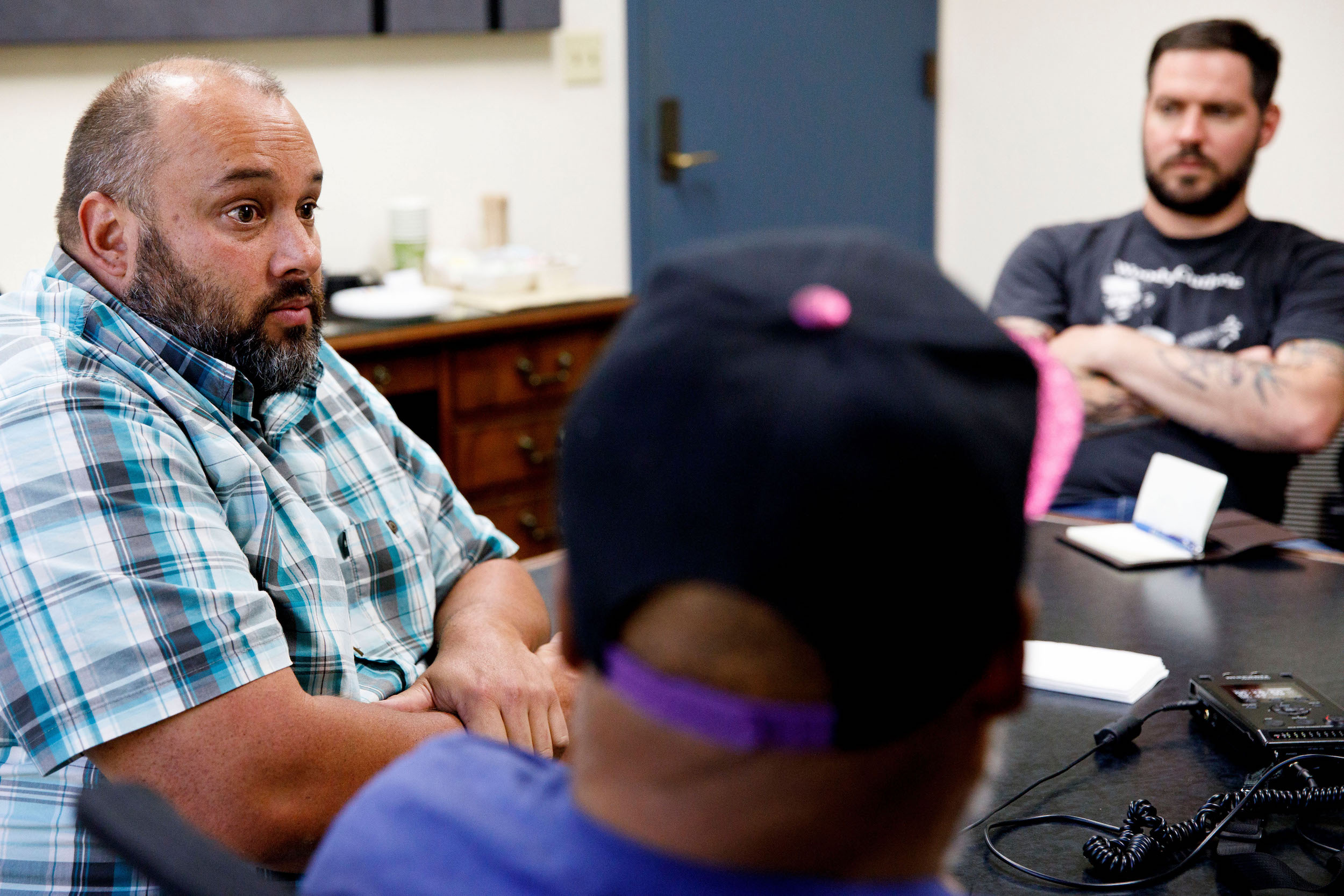
And I was like, so say what’s in your heart, say what you believe. If you believe it, it’s not the wrong thing. But you have to start saying something because all of these women — there were hundreds of women that were responding — they’re getting a response from a couple dozen men, maximum. There’s hundreds and hundreds who wouldn’t say shit. And it’s really sad. We’re sitting here in this room, and we’re the folks that are going to go and have these conversations outside of here, but those people are just not going to do anything. I don’t understand what their thinking could be, other than they just don’t want to deal with it.
Elford: They’re uncomfortable, and they don’t feel like they have the language to express themselves. It’s like one of the only areas where a lot of men don’t feel like they know what to say. I think that there’s a lot of people that I’m surrounded by who are afraid to use the wrong language ... and it’s like, their heart is on our side of the fence but they’re just learning so much, they’re like, “I don’t even know what this language means.”
Bishop: I do appreciate that. And I do agree with you entirely, Steven, but one facet of that is men just need to shut the fuck up at a certain point.
Severin: Sometimes.
Bishop: Like, on one end of the spectrum, if you’re a guy who’s responding to a situation by being all pro-woman, female empowerment, I hear you, but you’re taking up a lot of space with the volume. A better alternative to that is — I think I read something you said on Dave’s Facebook page, Riz, or part of what you said, is you just need to shut up and listen.
Sur: I think the reason for men not speaking is incredibly nuanced. I see posts about, “Why aren’t men calling out men they know that did that?” The couple men that I do know about, the victims made me promise not to say anything. What do I do? Other than keep tabs and tell anyone that gets close, Hey…
Elford: Watch them.
Sur: I’m sure I’m not alone in that. There is also a fear of being wrong. You [Riz] made a Facebook post about David Meinert, saying, “I have this many friends who are friends with him,” and I unfriended him, but it felt like it was a peer pressure thing.
Severin: It totally was.
Sur: I didn’t know Dave. And it took someone responding, saying, “Just imagine if you’re one of the victims, and you go on his [Facebook] friends list and see you there. Will they see you as an ally or not?” And I’m like, thank you. Yeah, that makes total fucking sense.
Rollins: A lot of people didn’t know they were friends with him. At the time that I wrote that, there were 420 [Facebook friends], and I thought, I wonder what they think. And I just picked five, a random five, and found that they didn’t seem to think anything. I thought, you gotta think something.
Men have a voice. We’ve always had one. We almost always, when this happens, shout everybody else down. We get louder. We don’t get softer, we get more aggro and then we come after you.
One guy I know went public. Well, a woman went public first, then he went public and he seemed to be — this is a phrase I picked up — “getting all the cookies.”
People were commending him on his bravery and owning his stuff. And nothing was said about this woman. Nothing, not about her, not to her. If you believe the conversations that are happening, he’s being a “better person,” and she’s being what? She is coping how?
Crosscut: What do you think about people who resurface after being accused? Louis C.K., for example. Some people thought it was OK, that he “did his time.” How much time is enough? And while you’re away, what action, if any, should you be doing?
Rollins: Well, 10 minutes can be enough time, if you go away to the right spaces. But if you’re going away so you can come back and get your cookies, then 10 years isn’t long enough. I don’t know exactly what an abuser is supposed to do. But I don’t see them doing anything. And so I feel like you don’t get to play at this party anymore.
Elford: Are there stories out there of well-known abusers who have found some kind of rehabilitation, or are speaking out?
Hasham: That’s my question, as well. Do they have a place to go?
Elford: Where’s the success story?
Bishop: The construct until now has been, let’s ignore it. Woody Allen, Roman Polanski, let’s not talk about it. I feel like we’ve only been holding people accountable in a serious way for a year. Has there been a progression in this new context?
Crosscut: What would holding perpetrators accountable look like? Do you ostracize them? Do you stay away from their businesses? Do you wait for them to take action in support of their victims? Is there some sort of restorative justice? Can they be redeemed?
Severin: There’s the level of what you’ve done and how you can rehab. Like, what Louis C.K. did compared to what David did. To me, Louis C.K. seems like he’s at a level that he could go and actually maybe get help and find a way to seek forgiveness from the women that he did wrong to. David ...was doing it because in his mind he was too big to fall.
Sur: It’s sort of like any disease: Do you search for the cure or do you seek treatment? But the big question is what do you do after someone has been outed? What do they need to do to get back in the good graces of society? I don’t know what the answer is, but I do know that it’s on them.
Rollins: Well, I want to hear what women think about that.
Sur: Totally, yes.
Bishop: I mean, even the idea of us as a group of six men, trying to decide what happens ... Honestly, it’s just circling back to we should all just shut up, and elevate the voices of women. We have to create a safe space, first. For that to occur, we have to re-orient the culture. We have to hold people accountable. We have to call shit out when it happens.
We had a band thread going a few weeks ago before a show. One of the guys in my band who’s known for making subtle jokes that were oriented around gender, he did it again. For the first time after 10 years that we’ve been together, another band member called him out in this brilliant way ... He just called him out. So, it’s in these small, micro-moments that we have to slowly change the recipe. And when I say we, I say as men — it’s on us to do that. But we shouldn’t be leading the way. It’s like, get out of the way. Listen.
Rollins: One thing that I’m learning is that if you have piggish business practices, you are likely to have piggish intersexual practices.
Elford: It’s about integrity.
Severin: In his mind, Dave thought... “I’ll be fine.” Because his whole world is around his businesses.
Most of the people that are saying, “I’m going to boycott the [Meinert-connected] Comet or I’m going to boycott Lost Lake,” they don’t go there anyway. I saw it at Block Party — the Comet was jammed. And this is while there are 8 1/2 x 11 posters with Meinert’s face, and it says “rapist” underneath. I mean, it’s right there. And they’re just walking right on in. So many people, unfortunately, didn’t care, and it gave him the thought that he could come back.
I believe in rehabilitation, because ... I mean, otherwise, what the hell is the prison system for, if not to try and help people learn from their mistakes? But when it’s so egregious, it’s going to take so much work to be able to get a chance to come back and try and make things right. And I don’t think he cares.
Rollins: As a Black man, I think the American prison system is primarily punitive, which in this case has some value. Not because I’m mean. Not even particularly because I’m angry. But it seems to me that if you get away without developing a sense of empathetic pain, you’re getting off scot-free. You’re just serving time, and then you’re going back and being whoever you are, saying, “I’m not touching nobody now.” And I don’t think that’s good enough — particularly for the women. Dude’s never going to be broke in his life.

